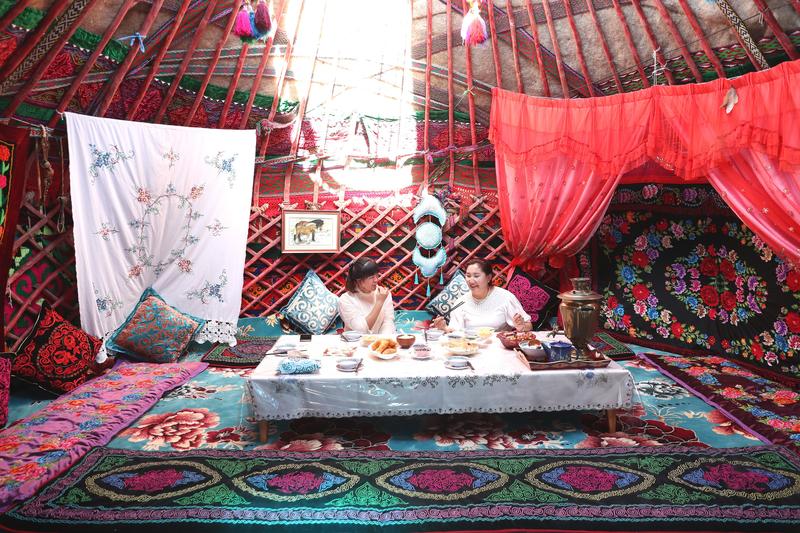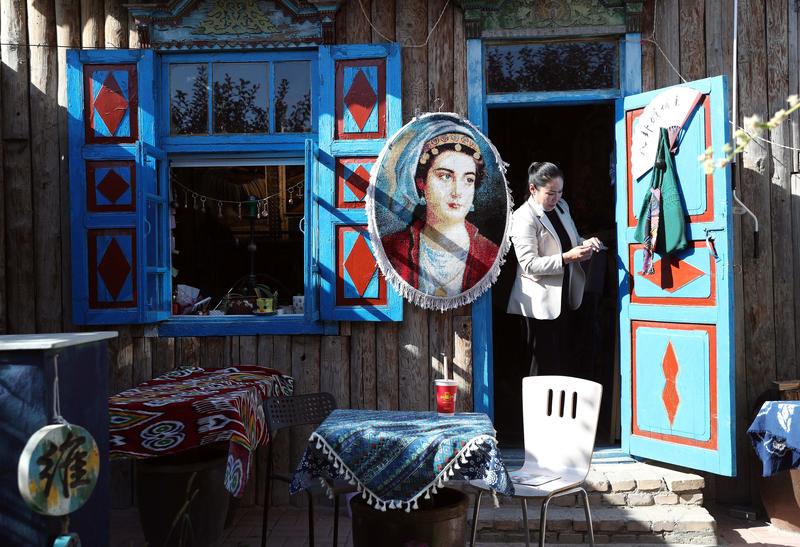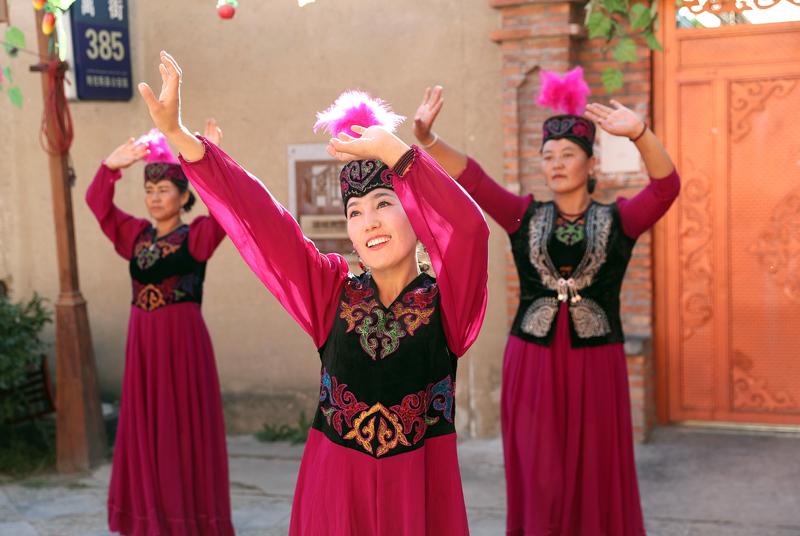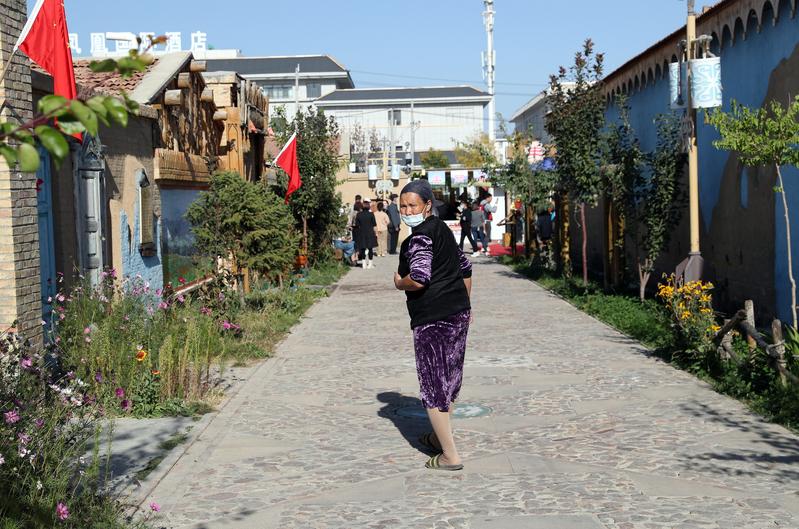Radiating from a city in the Xinjiang Uygur autonomous region, the thoroughfare provides opportunities through its booming tourism sector, report Xing Wen in Tekes county and Mao Weihua in Urumqi.
 Tourists enjoy a chilled-out moment in a nicely-decorated yurt in Tekes county, the Xinjiang Uygur autonomous region. The booming tourism sector in the county brings local residents business opportunities. (ZOU HONG / CHINA DAILY)
Tourists enjoy a chilled-out moment in a nicely-decorated yurt in Tekes county, the Xinjiang Uygur autonomous region. The booming tourism sector in the county brings local residents business opportunities. (ZOU HONG / CHINA DAILY)
Tekes county in the Ili Kazak autonomous prefecture, Northwest China's Xinjiang Uygur autonomous region, has long been renowned for its downtown area's road design which is laid out in a bagua pattern (the eight diagrams in Taoism).
It has a maze of 64 streets without traffic lights, with its eight main routes radiating out from the center of the city. Of the eight roads, the 1,700-meter-long section called Lijie street is among the most prosperous.
Most of my colleagues are vigorous young people who have the determination to expand e-commerce opportunities in Tekes.
Guo Xuemei, director of an e-commerce center
As tourism in Tekes county has thrived in recent years, Lijie street, which consists of lanes decorated with colorful murals and traditional residences of people from different ethnic groups, has turned into a popular recreational center that breeds business opportunities for people who set their mind to it.
Among all the traditionally decorated buildings along Lijie street, Zhang Ying's 20-square-meter bar, with its fancy modern designs, is an eye-catching example.
It has been open for four years and is run by Zhang, a 32-year-old Tekes native.
The booming tourism sector in the county gives her confidence in the prospects of the business.
"I've been busy during the peak tourism season, particularly from May to July," says Zhang. "Both tourists and locals would come for a drink with their friends to enjoy the peaceful, inviting summer evenings."
 Lijie street in Tekes county in Xinjiang Uygur autonomous region's Ili Kazak autonomous prefecture is a popular recreational center for both residents and tourists from around the country. (ZOU HONG / CHINA DAILY)
Lijie street in Tekes county in Xinjiang Uygur autonomous region's Ili Kazak autonomous prefecture is a popular recreational center for both residents and tourists from around the country. (ZOU HONG / CHINA DAILY)
A big screen has been set up in the bar, onto which she can project movies or sports games for visitors to watch.
"Soccer fans usually stay up late to watch games in my bar. Sometimes I can't shut the bar until 5 am," she says. "However, the busy period is always fulfilling for me."
During the off-peak season, she sometimes finds part-time jobs to fill her day or just chooses to enjoy a life of leisure.
"Opening a bar in my hometown enables me to live an easy, comfortable life. Basically, I can manage my time as I please. It also means that I can take good care of my daughter and my parents," she adds.
Next to Zhang's bar is a nicely decorated courtyard and a three-story building shaded by several verdant trees. It's Bakitgul Berdibek's house which, in 2016, she turned into a homestay business.
"We used to only offer accommodation to tourists. As the number of customers surged this year, we've launched a catering service for them as well," she says.
A yurt furnished with exquisite tapestries sits in the center of the yard. Inside, visitors enjoy a cup of tea and sample some local desserts, enjoying a chilled-out moment in the pleasant, Kazak-style surroundings.
"I plan to rent a nearby house from my neighbor to expand my homestay next year," she says.
 Lijie street in Tekes county in Xinjiang Uygur autonomous region's Ili Kazak autonomous prefecture is a popular recreational center for both residents and tourists from around the country. (ZOU HONG / CHINA DAILY)
Lijie street in Tekes county in Xinjiang Uygur autonomous region's Ili Kazak autonomous prefecture is a popular recreational center for both residents and tourists from around the country. (ZOU HONG / CHINA DAILY)
Homestays are becoming a new area of growth in Tekes county's tourism industry. The county boasts around 260 homestays which engage more than 1,000 people in the hospitality industry. Meanwhile, 13 more homestays are under construction, according to Shen Yanan, deputy director of the county's culture and tourism bureau.
Shen says the bureau has organized a group of experts to give homestay owners practical instruction on how to decorate their homestays and how to better operate their businesses.
"We will help to determine a homestay's theme and design based on the characteristics of its owner," he says.
"For instance, there's a middle-aged man who is good at doing woodwork and interested in training pigeons to do tricks. We suggested that he could run a pigeon-themed homestay with his handmade furniture," he adds.
Shen says that the bureau hopes that each homestay in Tekes county will have its own unique theme and style, which would add novelty value and have stronger tourist appeal.
They also distribute books that introduce the local cultures and history to each homestay for customers to read. Local art troupes and craftspeople have also been frequently invited by the bureau to tour the different homestays, performing for the guests and bringing them closer to the charms of the county.
 Lijie street in Tekes county in Xinjiang Uygur autonomous region's Ili Kazak autonomous prefecture is a popular recreational center for both residents and tourists from around the country. (ZOU HONG / CHINA DAILY)
Lijie street in Tekes county in Xinjiang Uygur autonomous region's Ili Kazak autonomous prefecture is a popular recreational center for both residents and tourists from around the country. (ZOU HONG / CHINA DAILY)
Expansion of e-commerce
In a lively corner of Lijie street is a two-story building in which well-packaged soaps, bottles of lavender oils, dairy puffs, dried apricots, nuts and an array of other specialties produced in Tekes county are arranged on the shelves for tourists to purchase. All the goods on show there can also be ordered online.
The building serves as the county's rural e-commerce public service center, with its first floor being used for displaying and selling various specialties, while its second floor is a place where free training sessions on e-commerce are regularly held for local people eager to work in the sector.
"As the county becomes increasingly popular as a travel destination, its e-commerce sector is looking to seize the development opportunity to promote local specialties, especially agricultural produce, that will generate new momentum for rural vitalization," says Guo Xuemei, director of the rural e-commerce public service center.
Guo once studied logistics management at a university based in Urumqi.
In 2016, Guo and her husband, a Tekes native, decided to leave Urumqi and return to the husband's roots in response to the county's active recruitment of young talent.
Guo soon started to work in the local rural e-commerce public service center.
"I've systematically learned the theoretical knowledge of e-commerce and become a qualified instructor in the field," she says.
She and her colleagues often travel across the county to give free e-commerce training to people, trying to incubate entrepreneurship in the sector.
"I love my job," Guo says. "Most of my colleagues are vigorous young people who have the determination to expand e-commerce opportunities in Tekes."
 Guo Xuemei, director of an e-commerce center. (ZOU HONG / CHINA DAILY)
Guo Xuemei, director of an e-commerce center. (ZOU HONG / CHINA DAILY)
More than 10,000 people from across the county have attended the free training sessions offered by the rural e-commerce public service center.
"We will first teach them some basic knowledge about e-commerce. If they are interested, a five-day camp will be organized for them to learn how to open a shop on e-commerce platforms and how to conduct livestream promotions," says Guo.
More than 600 attendees of the training sessions have already started to sell local agricultural produce online. Kanyat Kaypjan, a 50-year-old farmer from Kamistibulak village in Tekes county is among them.
Kaypjan started learning how to use a computer during off-peak season five years ago. After he was informed that the county's rural e-commerce public service center would reach out to his village and launch training sessions for the residents, he was the first one to sign up for the training.
As soon as he was equipped with the necessary e-commerce skills, he opened an online store on the Weidian e-commerce platform last year to help local farmers and herders to sell chicken, mutton, beef, eggs and other agricultural produce. Meanwhile, he has also been helping his fellow villagers to purchase goods from online shopping platforms, such as Taobao, JD and Tmall, as well as to pay their phone or electric bills online, or book bus tickets or hotels online.
Kamistibulak village has a population of more than 1,100, comprised of various ethnic groups including Kazak, Mongolian, Hui and Han. They mainly make a living through animal husbandry.
"In the old days, local herdsmen used to ride more than 20 km by motorbike to get to market in the downtown area of Tekes to buy groceries or sell livestock-even in the cold of winter," Kaypjan recalls.
"Now I can help them to shop more efficiently online, and I also want to use my e-commerce knowledge to promote the local specialties of Kamistibulak," he says, adding that he can earn, on average, 150 yuan (around $23.6) from the business each day.
Contact the writer at xingwen@chinadaily.com.cn


